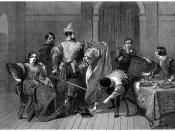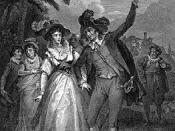Shakespeare's play The Taming of the Shrew presents the theme of marriage throughout the play yet probes at it showing a celebration of male dominance within a patriarchal society. However, the play fools all those that succumb to this shallow summary, as Shakespeare actually weaves a subversive manifesto as we move deeper into the play. Here, we see that it is the female who indirectly dominates, for she is more than a materialistic property as men see it. Shakespeare shows how appearances are not always reality and continually hints of a subversive manifesto as he presents us with subliminal messages of female trickery throughout the play.
Initially, a man's obsession with wealth and materialistic possessions such as his wife blinds him to the fact that they are able to intelligently manipulate his. Such an obsession towards power and wealth is shown by several male characters in the play who are fooled in the end.
As Petruchio famously quotes "I come to wive wealthily in Padua/If wealthily then happily in Padua (1.2)" we see his obsession with wealth, further emphasized by the repetition of wealthily. Shakespeare shows that Petruchio is only worried of his dowry and not of love hinting a subversive manifesto. Moreover, Petruchio refers to Katherina as, "my goods, my chattelsâ¦my ox, my ass, my anything (2.1)." Here, Petruchio basically objectifies his wife and the comparison shown between her and many objects shows that she I only seen as a materialistic possession. Viewing of his wife as such a materialistic possession prevents him form understanding her and the truth that he shall be fooled. Even Gremio joins in saying, "I had life take her dowry with this condition (1.1)" and the use of hyperbolic expression here again shows how Katherina is referred to only as a sum of money.



Good essay
Very good and interesting.
0 out of 0 people found this comment useful.